| |
|

|

|
|
| |
| |
| |
|
|
| |
|
Wishing you a Happy and Bright New Year!
Welcome to the ninth edition of the Research Newsletter and first in this year ! Read on for updates from Research Wing and some interesting blogs and articles written by our team members and collaborators in the past three months.
|
|
You may also want to share your thoughts or feelings on seeing some of these glimpses with us. Please feel free to do so at research@pradan.net
All the Research Newsletters are curated and edited by Arundhita Bhanjdeo in the Research Wing with design support from Visual Best. You can write to her at arundhita@pradan.net should you have any suggestions and questions.
You can check all the previous editions of
Newsletter here
|
|
|
We share our work with an aim to inform, draw interest amongst fellow colleagues and initiate wider possibilities of knowledge exchange, collaboration and practice. You can read more on the different research projects in ‘Research’ on sampark.net platform.
|
|
|
|
|
|
|
|
Embedding Traditional Knowledge About Diet and Health into Learning Resources
|
|
|
|
The GRTA-CHIRAG project on Sustainable Food Systems (SFS) project aims to address food and nutrition security alongside gender equality in the poorest regions of India and seeks to increase dialogue around diet and health and share knowledge. One way to enable communities to reclaim traditional knowledge about diet and health is through curriculum development. Two curriculums have been developed in the project, for: a) tribal youth, and b) university students and professional practitioners, and potentially with education providers and state departments to enable institutional uptake. For the tribal youth, PRADAN has developed a seven-module curriculum on SFS which consists of a series of workshops, interactive sessions and exposure visits for the tribal youth. The SFS project partners including PRADAN collaborated with experts from a range of Indian institutions to create a Massive Open Online Course called ‘Creative Communication, Extension and Community Resource Management for Sustainable Development’.
|
|
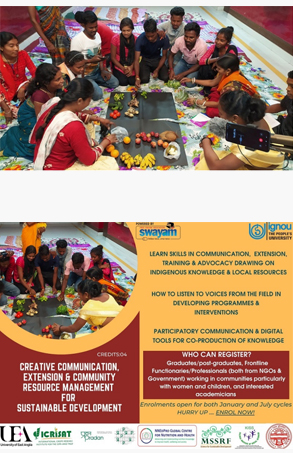
|
|
| |
The course launched in September 2021 and is hosted by SWAYAM platform and Indira Gandhi National Open University (IGNOU).
Read more in the blog written by Hannah Gray (Project officer at GRTA).
|
|
|
|
| |
|
| |
| |
|
|
Some steps for decolonizing international research-for-development partnerships
|
|
| |
Partnerships between researchers and practitioners from the Global North and Global South can be and often are intellectually and socially impactful, but they remain highly unequal.
Nivedita Narain along with collaborators Shreya Sinha, Bhaskar Vira, Cees Leeuwis and others articulate steps for decolonising international research-for-development partnerships on as a way forward for fostering partnerships between researchers and practitioners from the Global North and Global South.
|
|
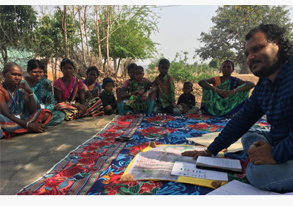
|
|
| |
Click here to read the article.
|
|
| |
| |
|
|
|
|
| |
| |
| |
Arundhita Bhanjdeo and Ayesha Pattnaik were invited to speak at the Central University of Koraput, Odisha as part of their three-day National Webinar on 'COVID-19 Pandemic, Lockdown and Migration: A Sociological Perspective'. They shared their learnings from the research (and published paper) conducted during the first wave of the pandemic highlighting experiences of migrant workers from Santhal Paragans region of Chakai in South Bihar to four Indian states namlely, Kerala, Gujarat, Uttar Pradesh and Maharashtra.
|
|
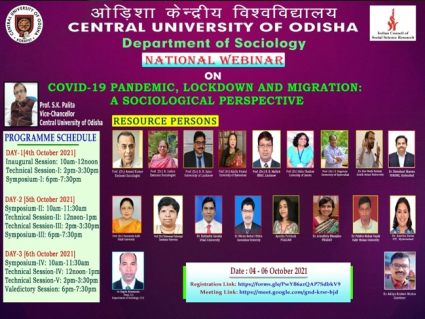
|
| |
The webinar was organised on the 6thOctober 2021 by the Department of Sociology. Before this they have presented this research at webinars organised by the University of Queensland, Australia and University of Edinburgh, UK.
|
|
| |
| |
|
|
| |
| |
| |
Arundhita Bhanjdeo and Shuvajit Chakraborty presented with Nivedita Narain on the policy panel at the special session on the TIGR2ESS project at the Agricultural Economics Research Association (AERA) conference 2021 organised by the Odisha University of Agriculture and Technology (OUAT). While Arundhita presented on migration and the changed gendered roles in agriculture, with learnings from Telangana, Tamil Nadu, Bihar and Uttarkhand; Shuvajit presented on implications for food systems due to climate change and adverse seasonality based on the learnings from Chakai. Nivedita, with other panel members deliberated on public policies that has the potential to transform agriculture and food systems.
|
|
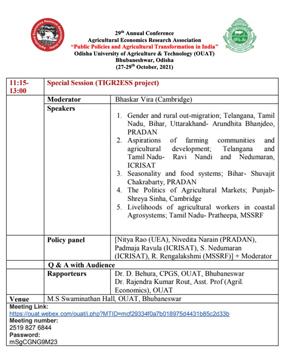
|
| |
| |
| |

|
| |
| |
| |
Two pieces of research have been selected for oral presentation and poster presentation at the 24th IUHPE World Conference on Health Promotion. This major event of the International Union for Health Promotion and Education (IUHPE) is held every three years and will take place from May 15 to 19, 2022 in Montreal, Quebec.
For more details of the conference, click here:
- Oral presentation: Nivedita Narain, Ayesha Pattnaik and Arundhita Bhanjdeo with Nitya Rao from the University of East Anglia submitted an abstract titled ‘Building capacities of Community Health Workers to improve nutrition outcomes in rural India using a Knowledge, Attitudes, Practices framework: A study in Bihar, India’ (Oral presentation).
- Another abstract title ‘Giving voice to Indigenous youth in India to advocate for Communities' Health’ was selected to be presented as a poster by Nivedita Narain with Nitya Rao and Ghezal Sabir, an independent researcher.
|
|
| |
| |
|
|
|
|
| |
Suraj Kumar, our collaborator from Kalinga Institute for Social Sciences met with Arjun Munda, the Minister of Tribal Affairs in the Indian Government, last week to brief him on the major policy recommendations arising from the GRTA-CHIRAG project.
Suraj and Nivedita Narain from PRADAN then met with Navaljit Kapur, Joint Secretary for Tribal Affairs to talk in more detail about how the ministry can support the community work longer term. In the next few months, we plan to meet policy makers at the state level specifically in Jharkhand, Odisha and Chhattisgarh to scale the key learnings from the work on indigenous knowledge system using an interactive community-media platform.
|
|
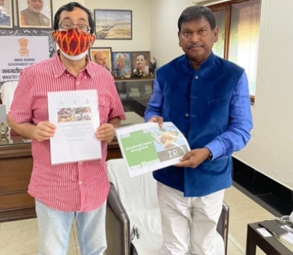
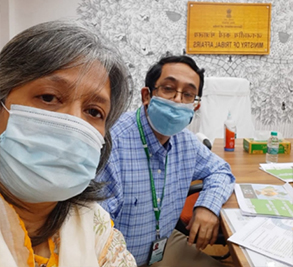
|
| |
| |
|
|
|
|
|
| |
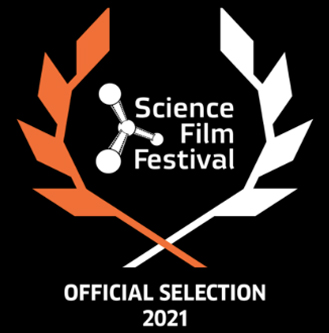
|
|
One of our Sustainable Food Systems (participatory film) films was selected for the International Science Film Festival. The festival received 287 films from across 52 countries and they have selected 122 films from 29 countries to make up the official selection and award competition of the Science Film Festival 2021. The film Food from the Forest: Kanthe Ara, Huter Baha, Kaath Oo was screened in no less than 4 countries - in Bangladesh, India, Pakistan and Sri Lanka - during the festival period last year, which ran from 1st October to 20th December 2021.
|
| |
Please note that we will get subtitled versions of the film in the languages of the countries mentioned, and Bangla may be particularly useful for reaching the Santhals in West Bengal too. Wonderful to see this work being recognized, but also really becoming a tool for empowerment of the local youth.
Click here to watch the film that was selected.
|
|
| |
| |
We are pleased to share our first comic book on Sin Arak. Sin Arak is a tree and the leaves of this tree are cooked and eaten by the Santhals. The comic book was prepared by Antara Raman, an illustrator who also works with PARI ( People's Archive of Rural India) and the story was written by Boro Baskey, a Santhal educator and community leader from West Bengal.
This is a part of our sustainable food systems agenda where we are documenting traditional knowledge systems as a part of the GRTA-CHIRAG project. We hopefully will have two more comics on different stories from them before March 2022. These books will be translated to Santhali before printing.
|
|
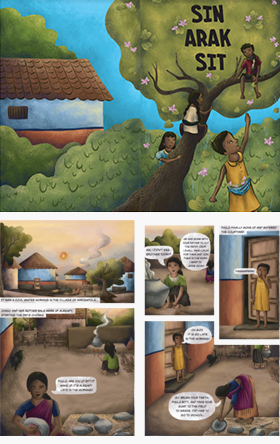
|
| |
|
|
|
|
|
| |
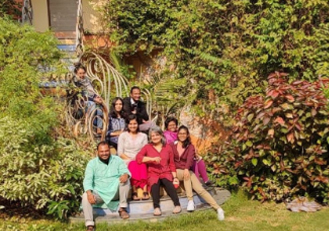
|
|
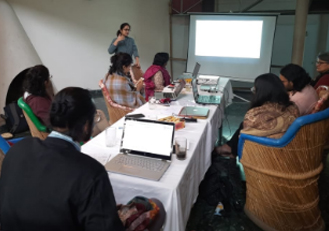
|
|
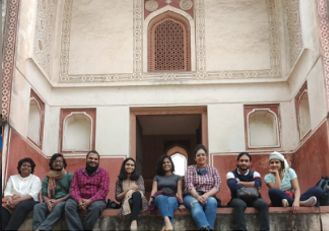
|
|
| |
All our research projects come to a close by March 31, 2022. We had all worked virtually over the past two years and those were tough times. To address this in part, we at the research unit got a chance for us to (re)connect, present our work to date, and plan for the closure of these projects.
A Review and Planning meeting was organised in Delhi from 12th November to 16th November 2021. During the meeting the team shared their deliverables, particularly in terms of papers and reports, that need to be presented and much more. Some of us also took a day off to explore Delhi.
|
|
|
|
Here’s what some of the team members had to say about this experience:
|
|
| |
 The review and planning meeting in Delhi was a wonderful opportunity to spend five days with colleagues whom I had not met in person before thanks to the pandemic. The series of workshops and presentations allowed me to showcase what I have done so far, and the feedback I received has provided ideas to improve and plan my work that lies ahead. I especially enjoyed learning details about the interesting research all my colleagues are engaged in. Although we have been able to accomplish a lot working virtually, it was particularly rewarding to spend time with the team outside of work and get to know them at a personal level. Few workplaces offer co-workers as friends, and the PRADAN research wing is one of them!
The review and planning meeting in Delhi was a wonderful opportunity to spend five days with colleagues whom I had not met in person before thanks to the pandemic. The series of workshops and presentations allowed me to showcase what I have done so far, and the feedback I received has provided ideas to improve and plan my work that lies ahead. I especially enjoyed learning details about the interesting research all my colleagues are engaged in. Although we have been able to accomplish a lot working virtually, it was particularly rewarding to spend time with the team outside of work and get to know them at a personal level. Few workplaces offer co-workers as friends, and the PRADAN research wing is one of them!
 The four days were very different from the usual. The presentations of every body's work motivated me and encouraged me to understand more about the wing. Especially I liked what Anju presented as I could mentally build a bridge between her geomorphological findings from the regenerative agriculture project and the implementing works happening in the organisation. Ramneek's management of the whole program was very commendable and appreciable. It was a very different experience for me as I met with everyone and had a good closure with the wing.
The four days were very different from the usual. The presentations of every body's work motivated me and encouraged me to understand more about the wing. Especially I liked what Anju presented as I could mentally build a bridge between her geomorphological findings from the regenerative agriculture project and the implementing works happening in the organisation. Ramneek's management of the whole program was very commendable and appreciable. It was a very different experience for me as I met with everyone and had a good closure with the wing.
 I have read once somewhere that an organization is one which not only takes your support but also act as the backbone to make you stand high as much as possible. PRADAN my first place of job truly stands on this idea. Starting my journey as intern and then to a contract employee, I have never felt that I am working for an organization rather it was akin to working for your own family. I not only got a direction but also love and respect which everyone will aspire for from an organization. The best things about the PRADAN is its non-hierarchical nature which really provides me a comfortable environment to work and grow. Whatever PRADAN has given me in this small period of time is really difficult to explain in one paragraph and I will always owe my success to PRADAN and specifically to Nivedita Ma’am.
I have read once somewhere that an organization is one which not only takes your support but also act as the backbone to make you stand high as much as possible. PRADAN my first place of job truly stands on this idea. Starting my journey as intern and then to a contract employee, I have never felt that I am working for an organization rather it was akin to working for your own family. I not only got a direction but also love and respect which everyone will aspire for from an organization. The best things about the PRADAN is its non-hierarchical nature which really provides me a comfortable environment to work and grow. Whatever PRADAN has given me in this small period of time is really difficult to explain in one paragraph and I will always owe my success to PRADAN and specifically to Nivedita Ma’am.
|
|
| |
|
|
|
|
|
|
|
The LSE Inequalities Institute working paper published by Naila Kabeer, Nivedita Narain, Varnica Arora and Vinitika Lal on titled Group rights and gender justice: Exploring tensions within an indigenous community in India was presented by Naila Kabeer, on 2nd December 2021 at a conference at the University of Arizona. She was a keynote speaker at the conference organised by the Center for the Philosophy of Freedom at the university. This paper draws on quantitative and qualitative research among the Gond, an Adivasi or indigenous community in the Chattisgarh state in India to explore this debate in greater detail. The paper is now being prepared to be published in the Journal for Social Philosophy.
Click here to read the working paper published in 2019.
|
|
| |
|
|
We are what we eat
|
|
| |
|
|
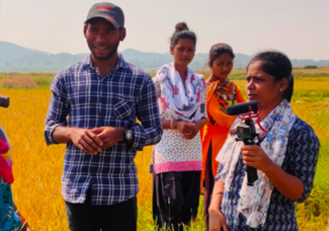
|
|
|
|
| |
| |
Our administrative officer at GRTA, Hannah Gray wrote a research story for the Overseas Development Assistance (ODA) celebrating GRTA-CHIRAG project which is harnessing traditional knowledge and digital solutions to make food systems in India sustainable.
Click here to read the story.
|
|
| |
| |
|
|
|
|
| |
|
|
Understanding dietary practices in marginalised tribal communities of India to improve nutrition security and combat risk of malnutrition
|
|
| |
The NNEdPro Global Centre for Nutrition and Health in Cambridge led by Professor Sumantra Ray along with the NNEdPro India team have been investigating the diets of ‘Santhal’ tribe communities in rural India to identify key nutritional gaps. This consultancy work is providing a nutritional science basis to the Global Research Translation Award (GRTA)- CHIRAG activities led by Professor Nitya Rao (UEA) in collaboration with Indian partner PRADAN in Chakai, South Bihar.
This piece of work is seeking to encourage diet diversification in rural communities to improve nutrition and health. By suggesting subtle changes to traditional recipes which complement existing dietary and lifestyle patterns, the partners hope to achieve nutritional adequacy for these indigenous communities.
To read the article click here.
|
|
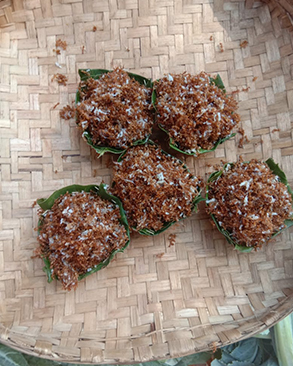
|
| |
|
|
|
|
| |
|
IKEA Foundation-PRIDE
(Regenerative
Agriculture):
The monitoring exercise under this project has completed its soil sampling exercise for the baseline study. The data has been analysed and soil quality maps have been produced. Thematic maps of water resources, land use land cover and soil quality layers have been created for the study sites. Further, a manual for replicating the procedures to create a temporally continuous data set using the same methods will be created and the data is being published through a website.
|
|
We have one comic book on traditional knowledge systems of the Santhals. This book is being translated to Santhali before printing it. We are working with NNEdPro Global Centre for Nutrition and Health a for nutritional assessment of Santhal recipes. PRADAN team had sent them around 32 individual recipes and 26 consumed menu templates for analysis that were produced by the community and documented by our team in Chakai. In turn, NNEdPro has provided us with around 20 menu templates that could provide individuals in the Santhal tribe with all their nutritional needs, making a conscious effort to honour the Santhali indigenous recipes as much as possible.
EMERGE
The manuscript titled “Measuring Women’s Political Empowerment” has been submitted to EMERGE in the UCSD. An academic paper is under preparation. The manuscript is co-authored by Soledad Prillaman and Natalya Rahman from Stanford University and Nivedita Narain from PRADAN.
Sustainability of SHGs (3ie)
Ongoing discussions with Centre for Policy Research to publish our report as a working paper and simultaneously working on a shorter version of the report to publish in a peer-reviewed journal.
TIGR2ESS
Two manuscripts have been submitted to journal:
- Resilience and wellbeing: A case for rural migrants in eastern India’ to World Development.
- Paper on FPOs to Journal of Rural Studies.
Two more manuscripts are under preparation:
- Looking at migration from a gendered agrarian perspective.
- Implications on food systems due to climate change and adverse seasonality.
For the final TIGR2ESS online workshops as an outputs for Policy The series of workshops to be held in January and February will summarise research activities and impactful findings, discuss challenges, and draw on opportunities to use collective knowledge of the team and the six flagship projects (PRADAN was a part of FP1) to support a holistic approach to policy change for contrasting agroclimatic zones across India. We have submitted five posters highlighting different pieces of work to be showcased during the workshops.
DEVELOPMENT-LED INQUIRY
A paper titled “Inquiring Systems and Development Led Inquiry: Uniting the Efforts of Farmers, Development Professionals and Researchers” was submitted to a special issue on Research Methods for the Third Sector in VOLUNTAS journal. A third round of reviews are being addressed by Nivedita Narain and Arundhita Bhanjdeo with collaborator Gavin Ramsay to be submitted in the first week of January.
|
|
|
GRTA-CHIRAG
The IVRS Monsoon Campaign was completed in October. The main focus of the campaign was to engage the listeners to think about dietary diversity during the Monsoon season and generate awareness about its importance. Total 1112 listeners have listened to the monsoon campaign through the IVRS platform The major themes of the campaign were five food groups; Starchy Staples, Vitamin A/C Rich Food, Iron Rich Food, Protein Rich Food and Oil & Fats. A winter campaign on similar themes have been launched in the second half of December. Since CHIRAG talks about the sustainable food system, the campaign content is focused on how we can acquire the food from five food groups within the local context. Whole campaign revolves around the character ‘Phulo’, who depicts the benefits of different food groups and food items. Campaign also consists of different programmes related to food recipes and agriculture information.
Three rounds of Dietary Diversity Survey was conducted with around 100 households in two panchayats of Chakai to measure the food consumption of households that reflects household access to a variety of foods in reference to sixteen food groups (according to FAO guidelines) in three different seasons: winter, summer and monsoon. It was a participatory approach; six community volunteers from the community had been trained to collect data and enter the data in the database. The comprehensive analysis report of surveys is awaited.
A paper titled "Cameras in the hands of indigenous youth: Participation, films and nutrition in India" was submitted to the Journal of the American Society for Nutrition called Current Developments in Nutrition (CDN) for a special issue on ‘’Impacts of Community Participation in Unlocking the Potential of Nutrition Interventions".
A policy paper on knowledge, attitudes and practices of community health workers in under preparation.
Two curriculums on sustainable food systems was produced. The IGNOU course on the SWAYAM platform is now been translated to Hindi to increase its reach, especially for frontline health workers and community workers.
|
|
|
| |
|
|
|
|
|
We bid farewell to Vinitika Lal and Anju Bhaskaran. Vinitika was working as a Researcher in the GROW (Gender Responsive Organisations for Women) and Organisational Life Cycles (OLC) project, and Anju was working in the OLC project and later in the IKEA Foundation-PRIDE project on Regenerative Agriculture as a Research Associate. Vinitika and Anju were both based out of Delhi. While Vinitika is taking on projects as an Independent Consultant, Anju has started working with the Council on Energy, Environment and Water (CEEW), a Delhi based public policy think tank as a Research Analyst.
|
|
| |
|
|
|
|
|
|
|
|
|
|

